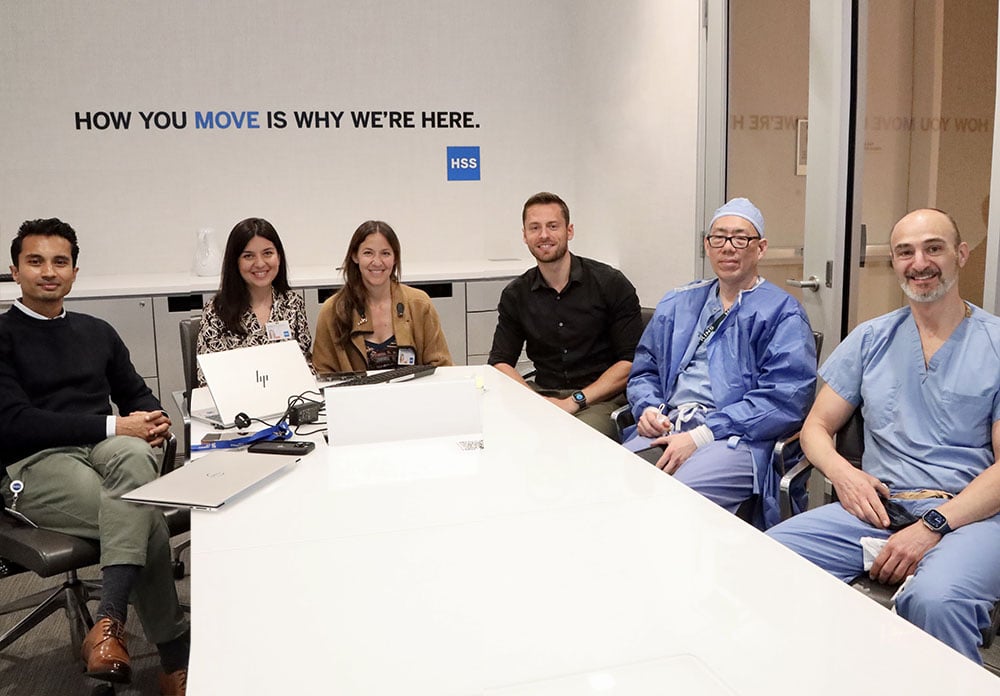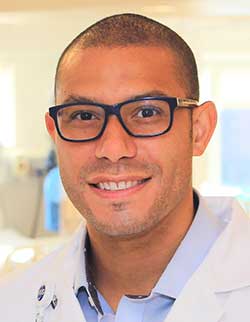Research Initiatives Division
Our researchers and staff continue to grow on the division’s history as a leader in the fields of anesthesia and pain management research. Notably, our research into regional anesthesia for total joint replacement surgeries has contributed to an overall increase in regional anesthesia use throughout HSS. In 2017, more than 80 percent of our joint replacement cases were done under regional anesthesia compared to only 20 percent nationwide. Learn more about our achievements, researcher stories, publications, and what's on the horizon in our Research Report: 2020.
You can also learn more about our department's participation in the 49th Annual Regional Anesthesiology and Acute Pain Medicine Meeting (ASRA 2024) program and the 6th World Congress on Regional Anesthesia & Pain Medicine.

Citations in high-impact research in 2023

Active studies managed in 2023

Articles published in 2023
Physicians
The Clinical Research Division oversees more than 60 active clinical trials at any given time, with additional studies continually in development. Visit the HSS Clinical Research Database for more information on our studies. Some of our areas of investigation include:
Physiology
Our physiology research aims to find a better understanding of the interactions between a patient’s underlying physiology and anesthetic/surgical techniques.
Perioperative outcomes
Our investigators study the effects of nerve blocks and the role of additives to local anesthetics to improve nerve blocks. Other studies investigate ways of minimizing the use of opioids and strive to identify serum biomarkers and psychological stratification for patients at risk for developing post-operative pain.
Pediatric anesthesia
Researchers focuses on the safety and efficacy of regional anesthesia in the pediatric orthopedic population. HSS’ pediatric patient volume provides a unique opportunity to measure outcomes such as side effects, rare complications and patient satisfaction. Two of our physician investigators are involved in the Pediatric Regional Anesthesia Network (PRAN), a multi-institutional tool dedicated to understanding trends into regional anesthesia for pediatric patients.
Point-of-care ultrasound
Point-of-care ultrasound (POCUS) skills are becoming increasingly vital for critical care specialists and anesthesiologists. Our research focuses on the impact of incorporating point-of-care ultrasound education into resident and fellowship curricula.
Database research
Our database research is driven to understand trends and analyze potential links between perioperative care and the recovery process.
Regional anesthesia
Nationwide, only 20 percent total-joint replacement surgeries are done using regional anesthesia compared to the 80% done at HSS. Our research helps determine the best uses for regional anesthesia techniques in the orthopedic setting in hopes of increasing its use nationwide for orthopedic procedures.
Multimodal analgesia
Due to its association with lower opioid use, multimodal analgesia techniques are being investigated across many replacement surgeries. Our department hopes to lead discussions and change prescription habits among surgical healthcare providers by investigating multimodal analgesia techniques and their impact on patient satisfaction.
Enhanced recovery after surgery (ERAS) pathways
ERAS pathways have been implemented across Europe and have been linked to lower opioid prescription rates and less pain following surgery. At HSS, our investigators are examining the impact of ERAS pathways across several service lines.
Patients & Anesthesia Research
The Department of Anesthesiology, Critical Care & Pain Management is committed to advancing medical knowledge and improving patient care. Medical research is the key to understanding which treatments, medications, techniques, or therapies are safe and effective for patients. Without research, we wouldn’t know that a nerve block improves pain control after foot and ankle surgery; that an epidural is better than general anesthesia for hip and knee replacement; or that patients with obstructive sleep apnea need extra attention after surgery.
These are all examples of clinical studies that have been conducted by researchers in the Department – thanks to the involvement of our patients.
What is a clinical trial?
A clinical trial is a research study. Each study is designed to answer specific questions to find new and better ways to help patients. A clinical trial has a master plan called a protocol that explains how the trial will work, what will be done, why, how many patients will be studied, and what type of data will be collected. If you are asked to participate in a trial, we will discuss the protocol with you, and provide a summary in writing.
Why should I participate?
People decide to participate for a wide variety of reasons. Often, patients want to help others by generating knowledge that will someday benefit patients with the same condition. Sometimes patients decide to join a trial so that they might receive the latest, most innovative care from experts in the field.
What should I expect?
Depending on the purpose of the trial, you may have more tests or medical examinations than you would if you were not taking part. For example, you may have extra blood tests or provide a tissue sample during your surgery. You may be asked to keep a diary about your health or medications, or fill in questionnaires at specified times. Some of these tests or questionnaires may need to be completed days, weeks or even months after your surgery or treatment at HSS!
What are the possible risks?
Clinical trials can have some risks. In general, a new strategy or therapy may not work, or it may not work better than the care we already provide patients. Sometimes a new therapy works for some patients, but not everyone, so it might not work for you. Before you agree to join a trial, your study team will discuss the specific risks (and possible benefits) in detail and you will have a chance to ask questions.
Do I have to do it?
No! Agreeing to participate is voluntary, and if you change your mind at any time, you can drop out of the study. However, please consider participation very carefully: the results of the study can be affected (negatively, in some cases) if patients drop out. We would rather that you say “no,” and be certain than say “yes” if you are uncomfortable doing so, and then drop out later.
How do I know if it’s safe?
Protecting your safety is our priority. At HSS, every clinical study must be approved by our Institutional Review Board (IRB). The IRB is a committee that includes doctors, nurses, statisticians, and community members. The job of the IRB is to provide scientific oversight of all clinical trials. A trial can only be approved by the HSS-IRB if it is deemed medically important, ethical, and protects the privacy and confidentiality of the patients who participate.
Written by Dr. Ellen Soffin, Associate Director of the Clinical Research Division within the Department of Anesthesiology, Critical Care & Pain Management.
Selected Journal Articles
The Pain Prevention Research Center (PPRC)

Founded in 2023, The Pain Prevention Research Center (PPRC) at HSS is unique in its focus and commitment to studying the prevention of pain and associated deleterious outcomes. There are limited effective and safe treatments for chronic pain. Most treatments are only modestly effective for a subset of people, and efforts to develop novel pain treatments have been largely unsuccessful. Given the prevalence of chronic pain, as well as its significant personal and societal cost and immense complexity, the most promising approach may be in its prevention.
Goals of the Center:
- Identify and apply innovative approaches to prevent acute and chronic pain.
- Identify, conduct, and disseminate high-quality research on the prevention of acute and chronic pain and its adverse consequences.
- Expedite the development of effective and safe therapies for those who suffer from chronic pain
In the News
- Three HSS Studies Presented at ESRA Annual Meeting Show that Ear Acupuncture During Hip Replacement Surgery Reduces Opioid Use
- HSS Pilot Study Announced at ESRA Annual Meeting Examines the Role of Cannabidiol in Total Knee Arthroplasty Pain Management
- Two HSS Studies Exploring Pain Control Win President’s Choice Awards at Annual ASRA Meeting
- Award-Winning HSS Study Uses AI to Identify Risk Factors Linked to More Severe Pain After Knee Replacement
- HSS wins two Best of Meeting Abstract awards and Patient Safety Award at 2024 ASRA Annual Meeting
- Study: Spinal, general anesthesia offer ‘reliable’ same-day discharge for outpatient TJA
- Acupuncture During Surgery May Help Patients With Nosocomephobia, an Intense Fear of Hospitals, Get the Medical Care They Need
- Novel Nerve Block Combination Decreases Opioid Use, Enables Earlier PACU Discharge Times After Hip Arthroscopy
- Mid-calf nerve block promotes fast recovery after total ankle replacement
- Peripheral nerve blocks benefit older, healthier patients undergoing TJA
- Mid-Calf Nerve Block May Enable Early Rehabilitation After Foot and Ankle Surgery, Preventing Pain While Allowing Foot Movement
- Peripheral Nerve Blocks in Total Joint Arthroplasty May Provide the Best Reduction in Complications in Older Patients With Fewer Comorbidities
- Innovative Hospital: Hospital for Special Surgery












